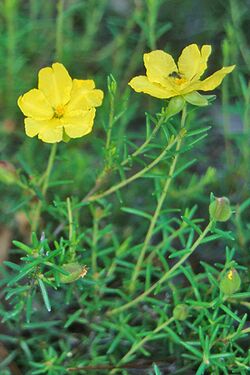Biology:Hibbertia cistoidea
| Hibbertia cistoidea | |
|---|---|

| |
| On Carnarvon Station Reserve | |
| Scientific classification | |
| Kingdom: | Plantae |
| Clade: | Tracheophytes |
| Clade: | Angiosperms |
| Clade: | Eudicots |
| Order: | Dilleniales |
| Family: | Dilleniaceae |
| Genus: | Hibbertia |
| Species: | H. cistoidea
|
| Binomial name | |
| Hibbertia cistoidea (Hook.) C.T.White[1]
| |
Hibbertia cistoidea is a species of flowering plant in the family Dilleniaceae and is endemic to eastern Australia. It is an erect shrub with hairy foliage, linear to narrow lance-shaped leaves, and yellow flowers arranged on the ends of short side shoots, with six to twelve stamens arranged on one side of the carpels.
Description
Hibbertia cistoidea is an erect shrub that typically grows to a height of 0.6–1.0 m (2 ft 0 in–3 ft 3 in) with foliage covered with star-shaped hairs. The leaves are linear to lance-shaped with the narrower end towards the base, 4–15 mm (0.16–0.59 in) long and 1–2.5 mm (0.039–0.098 in) wide, the tip wedge-shaped or notched and the edges rolled under. The flowers are on the ends of short side shoots and are sessile or on a peduncle up to 8 mm (0.31 in) long. The five sepals are 4–6 mm (0.16–0.24 in) long and the petals are yellow and 5–6 mm (0.20–0.24 in) long. There are six to twelve stamens in a group on one side of the two hairy carpels. Flowering occurs from spring to autumn.[2]
Taxonomy
This species was first described in 1848 by William Jackson Hooker who gave it the name Pleurandra cistoidea in Thomas Mitchell's Journal of an Expedition into the Interior of Tropical Australia.[3][4] In 1946, Cyril Tenison White changed the name to Hibbertia cistoidea in Proceedings of the Royal Society of Queensland.[5][6] The specific epithet (cistoidea) means Cistus-like.[7]
Distribution
This uncommon hibbertia occurs in Queensland and as far south as the South West Slopes in New South Wales.[2]
See also
References
- ↑ "Hibbertia cistoidea". Australian Plant Census. https://biodiversity.org.au/nsl/services/apc-format/display/94249.
- ↑ 2.0 2.1 "Hibbertia cistoidea". Royal Botanic Garden Sydney. https://plantnet.rbgsyd.nsw.gov.au/cgi-bin/NSWfl.pl?page=nswfl&lvl=sp&name=Hibbertia~cistoidea.
- ↑ "Pleurandra cistoidea". APNI. https://id.biodiversity.org.au/instance/apni/502985.
- ↑ Mitchell, Thomas Livingstone (1848). Journal of an Expedition into the Interior of Tropical Australia. Sydney. p. 363. http://www.gutenberg.org/files/9943/9943-h/9943-h.htm. Retrieved 28 April 2021.
- ↑ "Hibbertia cistoidea". APNI. http://id.biodiversity.org.au/instance/apni/517611.
- ↑ White, Cyril T. (1946). "Contributions to the Queensland Flora, No. 9". Proceedings of the Royal Society of Queensland 57: 21. https://www.biodiversitylibrary.org/item/195752#page/31/mode/1up. Retrieved 28 April 2021.
- ↑ Sharr, Francis Aubi; George, Alex (2019). Western Australian Plant Names and Their Meanings (3rd ed.). Kardinya, WA: Four Gables Press. p. 164. ISBN 9780958034180.
Wikidata ☰ Q17395155 entry
 |

